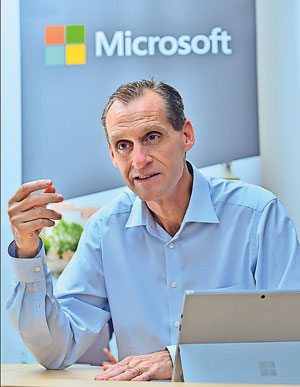Microsoft’s ‘Egg’ solution to installing mobile classrooms in remote and deprived regions
View(s):
Don Carlson
Sri Lanka is no stranger to the transformation of containers to more innovative use at the end of its ‘tenure’.
There are one or two logistics companies that have created and innovated with containers as office space or even classrooms as seen recently in an educational institute at Bambalapitiya.
With space becoming an issue in most cities, the day when containers are also used as accommodation units is not far away in today’s age of technology, innovative and creative thought.
That’s exactly what Microsoft – along with partners and the Government – has conjured up in the Philippines. Faced with improving the skillsets needed for today’s education in far flung areas where power, accessibility and remoteness of location is an issue, the ‘Egg’ emerged: A computer lab in a 40 foot container that can sit 15 students at a time complete with its own innovative power source!
During a fascinating conversation on 21st century education strategies with Don Carlson, Education Director, Public Sector, Asia-Pacific Region, Microsoft – who was in Colombo earlier this month -, the latter explained to the Business Times in detail how this ‘great’ experiment has worked and hopefully could be replicated in other parts of the Philippines and elsewhere in remote regions of Asia.
“Equity is one area that we are seriously working on with governments. For example do students have equal access to education? And this should not be limited because they are male or female; should not be limited because of where they live – everybody should have the same access,” said Mr. Carlson, a teacher himself, at one time in his working career.
The equity principle particularly in underprivileged communities was what got Microsoft and partners in the Philippines cracking to reach out to areas that don’t have enough classrooms.
The group together created a 40 foot container as a self-contained unit that can be moved into these remote places. Named the “Egg”, this unit generates its own power through a very innovative solar panel source with storage up to three days.
“It also produces its own water through the humidity in the air and also cools the engine room (server room for the computers). It can be used as a computer lab or a storage centre,” he added, explaining enthusiastically about this project. The Internet works up to a radius 30 km through the use of what is called “TV white space” described in technology circles as “gaps left by TV networks for buffering purposes”. If this is a hurdle then drones could be an option.
 “You could use drones that go to the nearest station, sync the Internet and bring it back to the computer lab and sync it from there so there is connectivity,” he said, adding that these are some of the ways of tackling some of the larger issues that the “Egg” would have.
“You could use drones that go to the nearest station, sync the Internet and bring it back to the computer lab and sync it from there so there is connectivity,” he said, adding that these are some of the ways of tackling some of the larger issues that the “Egg” would have.
What Mr. Carlson was emphasising is that while there is no instant remedy for flaws and gaps in innovative product-making, it would probably take another innovative way to close the gaps and solve issues.
The team’s local partner was a company named H2O which provided the power source. The challenge to H2O was – there is a very serious problem of access to technology and electricity in some of the more remote areas, so “how can you help us (Microsoft)”, he said.
After overcoming the power challenge, the group was confronted with a bigger issue; transporting a fully loaded 4o foot container by barge or military helicopter which comes at a huge cost.
No worries. The partner comes up with a ‘flat pack’ strategy in which the container is stripped down and pieces shipped separately. Hey presto, the cost is sharply reduced and innovation has won the day.
The ‘Egg’ was launched about 6-7 months ago in one location and looking at the potential in other parts of the country.
Replicating the model in other countries? “Absolutely yes but this has some interesting challenges as well. This is not similar to what we have done in the past. From a business model perspective it could work,” he said.
Discussing Microsoft’s general links with education, Mr. Carlson said that all over the world, there is a keenness on improving education.
Governments want to talk about improving the quality of education, that’s their first priority. The second is about student employability, and the third one is equity and access.
Quality essentially means improving teacher effectiveness in the classroom. “It doesn’t matter whether it’s a public school, private school of international school – the effectiveness is essentially on quality of the teacher in the classroom. There are a number of things that help – school leadership, online teaching materials, and professional development but fundamentally we need to make sure we are focused on the teacher,” he notes, adding that fundamentally the change comes in improving the teaching-learning experience in which Microsoft is actively engaged in.
Employability of students is also important. This is a key driver of competitiveness in the region based on the simple premise that countries with an educated workforce equipped with the skills set ready to meet the challenges even beyond the 21st century, will be the ones that would attract foreign capital and other attention.
Discussing some examples, Mr. Carlson said that in Cambodia for instance, the authorities are focused on STEM (science, technology, engineering and maths) and taking away seats available at the university from business streams – as there are way many business students – and redeploying in the STEM area. (Feizal)


